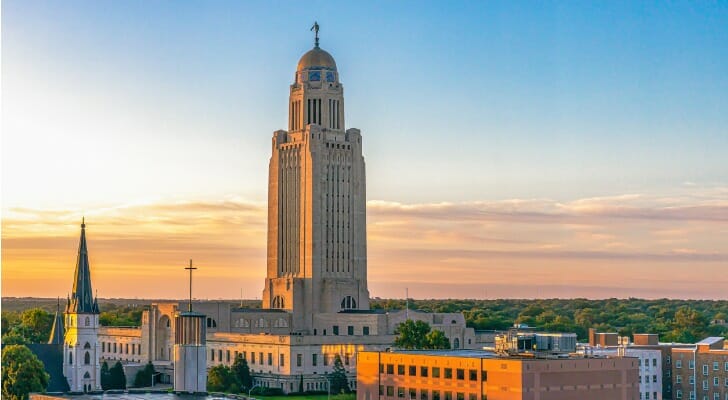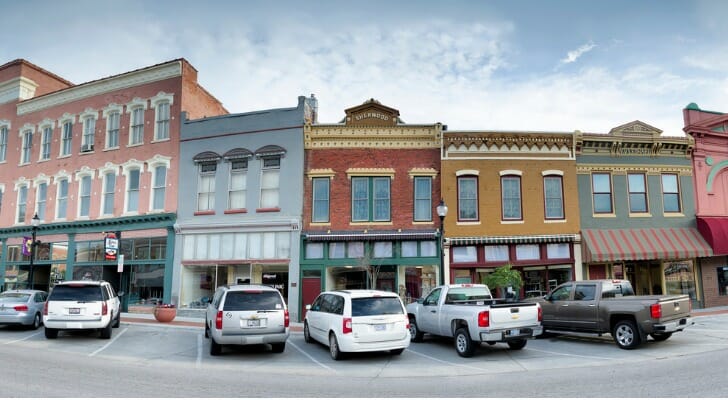 Nebraska has one of the lowest coronavirus infection rates in the nation, and the governor has not issued a blanket stay-at-home order as many other governors have done. Nevertheless, the pandemic has affected people and small businesses in the Cornhusker State. By mid-May 2020, Nebraska had 9,075 cases and more than 107 fatalities because of COVID-19. Unemployment is soaring: There have been 83,000 initial unemployment claims in five weeks, roughly the number of applications the state saw in the last two years combined. By mid-April, the jobless rate was 4.2%. The good news is that residents and small businesses affected by the coronavirus and its economic fallout can avail themselves of state and federal help as the crisis continues. Here is an overview of the programs and resources available to Nebraskans.
Nebraska has one of the lowest coronavirus infection rates in the nation, and the governor has not issued a blanket stay-at-home order as many other governors have done. Nevertheless, the pandemic has affected people and small businesses in the Cornhusker State. By mid-May 2020, Nebraska had 9,075 cases and more than 107 fatalities because of COVID-19. Unemployment is soaring: There have been 83,000 initial unemployment claims in five weeks, roughly the number of applications the state saw in the last two years combined. By mid-April, the jobless rate was 4.2%. The good news is that residents and small businesses affected by the coronavirus and its economic fallout can avail themselves of state and federal help as the crisis continues. Here is an overview of the programs and resources available to Nebraskans.
Nebraska Coronavirus Relief for Individuals
The state has both new and existing programs available to individuals. Some programs, such as unemployment benefits, have been expanded to include more people affected by coronavirus. The new Test Nebraska program has a dedicated hotline, 402-207-9377, for Nebraskans seeking to be tested for COVID-19.
Expanded Unemployment
Nebraskans have long had access to unemployment insurance benefits. However, the parameters on who qualifies for unemployment have been expanded. Therefore, Nebraskans can qualify for unemployment benefits if – because of the coronavirus – they have:
- Lost their jobs
- Been laid off
- Had their hours reduced
- Are unpaid due to work being shut down
- Are in quarantine
- Must care for a family member who is sick or they are sick themselves
- Must care for a family member due to a school or other closure
- Are self-employed workers
Unemployment benefits also now extend to gig workers and people with short work histories.
Apply for Nebraska unemployment benefits here.
Housing
For homeowners, the CARES Act allows mortgagees with federally backed loans to ask for forbearance or to temporarily suspend their payments. This does not happen automatically, and you must request forbearance from your loan servicer. You will also need to continue paying your taxes in the state of Nebraska. You may be eligible for tax relief through the Nebraska Homestead Exemption Program. To see if you are eligible for this program, contact your country treasurer or learn more at this link.
If you are a renter, it is important to note that evictions have not stopped in the state of Nebraska at this time. Governor Ricketts’ executive order applies only to evictions related to non-payment of rent due on or after March 13, 2020. If you rent from a private landlord, it may be more difficult to get a rent deferral than if you are renting from a large company.
While evictions due to COVID-19 have been suspended, landlords may still ask for and pursue rent fees. The existing law that protects renters in Nebraska is the Uniform Residential Landlord and Tenant Act. Be sure to check their website for any additional revisions to this act.
Utilities
If you pay utilities, there are always programs in place that help Nebraskans make ends meet for essential services. The United Way has information on community resources available. If you have lost your job or have taken unpaid leave, unemployment benefits are designed to help with these costs, and if you need energy assistance, the DHHS Low Income Home Energy Assistance Program (LIHEAP) helps low-income households with heating and cooling costs as well as crisis assistance. These programs have always been in place.
In response to COVID-19, the Metropolitan Utilities District will not disconnect gas or water due to non-payment. The Omaha Public Power District has also suspended any terminations of service due to non-payment. Most energy and utility providers in Nebraska have followed suit. To see how your area is handling utilities during COVID-19, check out this link.
Food
The State of Nebraska’s Department of Health and Human Services (DHHS) has always maintained economic assistance programs such as Aid to Dependent Children (ADC) and Emergency Assistance and the Supplemental Nutrition Assistance Program (SNAP). Additionally, Medicaid and disability-related assistance are available. The state has expanded the parameters of who can qualify for these programs, and we encourage anyone struggling to find adequate food to visit the DHHS website. In addition, there are numerous religious groups that run soup kitchens or deliver food to the needy.
Childcare
The governor in April issued an executive order to expand childcare options for working Nebraska families and to provide relief for childcare centers participating in the state’s Child Care Subsidy Program. The order suspends two regulations governing the program. First, the order allows licensed child care providers within the program to bill the state for days when a child is absent from care. Second, the order enables families participating in the subsidy program to obtain in-home child care when other options are unavailable.
Nebraska Coronavirus Relief for Small Businesses

The Nebraska Department of Economic Development (DED) is partnering with Gov. Pete Ricketts to help businesses apply for adequate funding during the ongoing COVID-19 pandemic.
The DED has allocated a Community Development Block Grant (CDBG) to help businesses in the state. This funding is available at this website and is designed to help two types of for-profit businesses: those eligible for the Nebraska Advantage Act and those that provide essential goods and services with at least 51% low- to moderate-income population. Businesses in large cities such as Omaha, Lincoln, Bellevue, and Grand Island are not eligible.
Another resource for small businesses is the state’s Community Development Resources, formerly known as the Self Employment Loan Fund of Lincoln. It was established in 1994 to fill a gap in access to capital resources, technical assistance and training for low-income, minority and women business owners. Loans from the CDR may be used for real estate, equipment, furniture and fixtures, inventory and working capital.
Federal Coronavirus Relief for Individuals
There are many programs offered by the U.S. government designed to aid people who have been financially impacted by COVID-19. The coronavirus stimulus package provides direct cash payments to individuals who meet specific income thresholds. People who earned less than $75,000 and filed their taxes in the last two years will earn a maximum of $1,200. The benefit will decrease as income increases up to $100,000. Married couples and people with children will receive a larger amount. You can learn how much you will receive using this link.
If you, a household member, or a dependent are affected by COVID-19, you may also qualify for coronavirus sick leave. The CARES Act has provisions offering enhanced coronavirus unemployment benefits, coronavirus relief for rent and mortgage payments, student loan relief, and a tax deadline extension.
If you lose your job or have your working hours decreased due to coronavirus, you may be eligible for one of three programs. These programs are the Pandemic Unemployment Compensation (PUC), Pandemic Emergency Unemployment Compensation (PEUC), and Pandemic Unemployment Assistance (PUA). The unemployment benefit expansion also allows employees to claim up to an additional 13 weeks of unemployment. This means that most states will allow a total of 39 weeks of unemployment benefits.
In addition to the CARES Act, many banks are helping customers who are affected by coronavirus. Many companies are also helping impacted people, and all Americans can now file their taxes through July 15, 2020. Additionally, information regarding rent and mortgage relief is available here. You can view all of the individual relief programs here.
Federal Coronavirus Relief for Small Businesses
Some small businesses will qualify for federal financial support during COVID-19. A $2 trillion stimulus package initially dedicated $349 billion to small businesses. Congress increased that amount by $310 billion in April. Additionally, the Paycheck Protection Program is offering loans of up to $10 million or 2.5. times a business’s average monthly payroll costs to businesses. These loans are fully forgivable permitting that 75% of the funds go toward payroll costs. Businesses may use the remainder on rent, utilities, and other approved expenses. This program is meant to help employers with less than 500 employees to keep their employees on the payroll.
The Economic Injury Disaster Loans are SBA-administered loans that provide up to $2 million to businesses and nonprofits that are experiencing a revenue loss during coronavirus. The program also provides a $10,000 cash advance for eligible applicants. These loans are only available in states that have declared an economic disaster.
The Main Street Lending Program is not connected to the SBA. Instead, it is run by the Federal Reserve and is designed to help banks give money to businesses in need of money during COVID-19. Businesses with fewer than 10,000 employees are encouraged to apply. If your small business has also received money from the PPP, you are still eligible to apply for the Main Street Lending Program loans.
Finally, businesses can apply for the SBA Debt Relief Program, the SBA 7(a) loan program, the Express Loan Program, and the express bridge loans.
You can find a summary of programs for businesses here.
The Bottom Line
 Nebraska’ expansion of its existing assistance programs is beneficial for both individuals and small businesses. This assistance, paired with the federal government’s funding for individuals and small business, is intended to reduce the impacts on individuals and families during the coronavirus outbreak. Nebraskans can leverage both state and federal programs to supplement their income and lessen the financial burden.
Nebraska’ expansion of its existing assistance programs is beneficial for both individuals and small businesses. This assistance, paired with the federal government’s funding for individuals and small business, is intended to reduce the impacts on individuals and families during the coronavirus outbreak. Nebraskans can leverage both state and federal programs to supplement their income and lessen the financial burden.
The pandemic is constantly changing, as are the state and federal assistance programs. It is wise to keep up to date on local and national news so that you’ll be in the know about any new relief programs that emerge.
Tips for Managing Finances in the Crisis
- Many financial advisors specialize in working with business owners. Finding the right financial advisor that fits your needs doesn’t have to be hard. SmartAsset’s free tool matches you with financial advisors in your area in five minutes. If you’re ready to be matched with local advisors that will help you achieve your financial goals, get started now.
- Several companies are supporting coronavirus-impacted people, and banks are also taking steps to help their customers. For a comprehensive list of the programs available to small businesses, check out our guide to coronavirus relief for small businesses.
Photo credit: ©iStock.com/Miriam Bade, ©iStock.com/Dean_Fikar, ©iStock.com/JulianneGentry